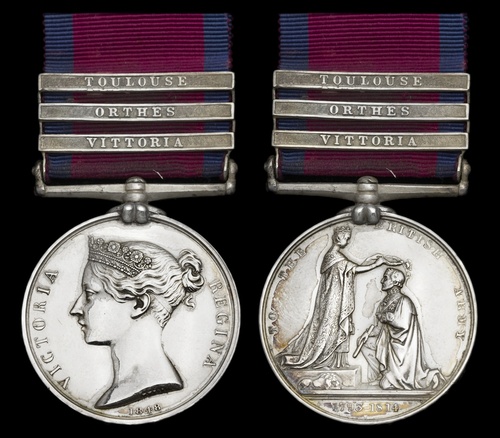
Auction: 25001 - Orders, Decorations and Medals
Lot: 8
Military General Service 1793-1814, 3 clasps, Vittoria, Orthes, Toulouse (W. Cook, 20th Foot.), traces of lacquer, very fine, mounted as worn
Provenance:
Glendining's, September 1987.
William Cook was born at Totham, Essex circa 1785 and was a labourer also serving in the West Essex Militia upon his enlisting in the 20th (East Devonshire) Regiment of Foot (Lancashire Fusiliers) at Haslar under a bounty of £5-5-3; a vast sum in that period. At that time he was described as having dark eyes, dark hair and a 'brown' complexion, perhaps being of West Indian heritage whose parents had made it to England.
Cook was wounded by gunshot at Orthes. A fine account is offered by Colonel John Hogge, K.H., who commanded the Light Company:
'I embrace the first moment I had to spare since the battle of the 27th to let you know I have again escaped one of the most murderous battles that ever I believe the old 20th witnessed. I had three most wonderful escapes, three balls struck me, one entering the glass you bought me in London, when in the act of looking at the troops opposed to us, the ball still remains in but has entirely destroyed the glass. Another entered my jacket near the right breast, was turned by striking a button, passed along my waistcoat, came out and badly wounded a man of my company. A grape shot struck the top of my shoulder, carried away the bugle and most of my right wing but did no other injury except a slight bruise. You will say my dear brother I am a fortunate fellow, I think to myself, for I believe no man ever had narrower escapes, the jacket and spyglass I shall preserve and one day I hope to show you them. I shall now begin to relate what passed on that eventful day confining myself to that part of the tragedy our Brigade acted.
The Light Companies of the 23rd, 7th, 20th, and a company of Rifles were in advance about 2 miles, when we came in contact with the advance post of the enemy, we immediately engaged them and drove them about a mile into a village where they had posted, unbeknown to us, a number of men in every part. We attacked it three times but did not succeed, soon after two companies of the 7th reinforced us and we quickly drove them out, took possession and retained it till the Brigade came up, we lost in this affair two Captains and about 60 men out of the light companies of the Brigade, eleven of my company were killed and wounded. It was here I had two escapes. We were then ordered to join our Regts. I found mine just in rear of the village.
Soon after an order came to us to advance and support our Portuguese Brigade, as they had just given way about half a mile in front of us. The great bone of contention was a small town [St Böes] and a range of hills just in the van of it, upon which a strong column of French were posted with 6 pieces of Artillery. The main road ran directly through the town, and the heights and all the Artillery commanded it, we fixed bayonets and there the bloody scene commenced. I passed the Portuguese and actually carried the town under a most dreadful fire of grape shot and musquetry, that ever a regiment was exposed to, out of 291, all we had, 126 men and nine officers were killed and wounded. We had two other officers wounded but they were not returned so, being slightly hit. The enemy attempted again to take it from us, they got into the town but we managed to drive them out again. They carried away about 25 of our men and Captain Tovey, they surrounded them. The 7th Division soon came up and the French retreated in all directions. We followed till darkness put an end to the contest.
Genl. Moss was wounded but not badly before we took the town. Major Bent who nobly commanded us had first his horse shot and was immediately afterwards killed himself. Three balls entered him. One Captain killed and three badly wounded. Capt Russell commands what few of us are left, he certainly gets the Brevet. Col Ellis, who commands the Brigade, rode into the town after we had taken it and declared that there never was a more gallant thing done by any Regt, and his Lordship sent in soon after to know what Regt it was that had taken the town. It is certain that they had in it double our numbers, posted so as to rake every part of the road leading through the town. Had we not succeeded we should have been cut to atoms, the only chance we had was to charge through it instantly, and after driving them out get under cover of the houses. It was impossible for our men to have stood it for five minutes longer, the grape from the Artillery on the hills cut us down by the dozens at a time. I got off most fortunately with the loss only of a strap. We mustered on parade next day only 144 men and nine officers. Soult may now say he annihilated us.’
Cook was in fair shape to share in the action at Toulouse and was discharged on 31 January 1816.
Subject to 20% VAT on Buyer’s Premium. For more information please view Terms and Conditions for Buyers.
Estimate
£1,600 to £2,000
Starting price
£1400




